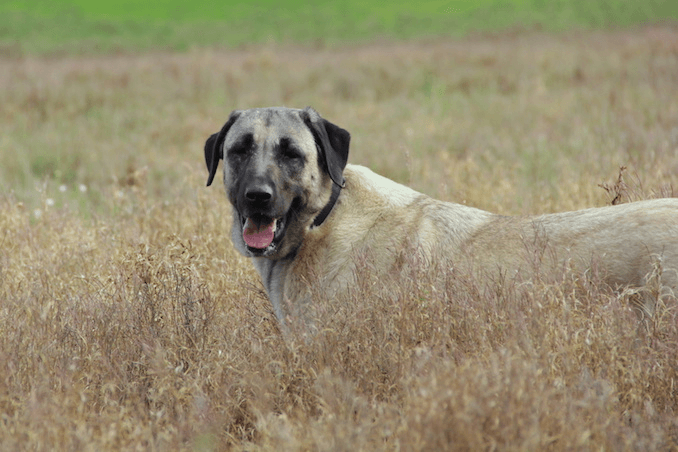We all know some of the problems associated with roosters when protecting your flock of hens:
- Noise
- Aggression
- Mounting your hens
When we think of our roosters, we rarely think of them as a guardian, but that is their primary role when it comes to a small holding or farm. If not for egg fertilization, keeping your flock safe is the primary responsibility of your rooster.
With all this responsibility, roosters can sometimes display aggressive behavior beyond what is acceptable as they are never one to back down from a challenge or protecting their flock.
When it comes to different animal guardian groups, there are alternatives to using roosters for protecting your hens. One of which is to use a Kangal Livestock Guardian Dog.
A Kangal is a 140-pound, all-Turkish guardian dog, which has been used in the US for the past 30 years for livestock guardianship and more recently flock/poultry guardianship. Kangals have a strong temperament for protecting their herds.
Today we are going to compare how these Kangal guardian dogs hold up against a rooster for protecting your flock.

Noise Levels
Roosters have been recorded at producing 90 decibels, matching the bark of a dog. We must also consider the frequency of noise and the reason behind it. Noise because of a predator is a perfectly valid response.
However, as we know a rooster loves to hear their own “cock a doodle doo” from sunrise to sunset.
Kangals, on the other hand, are a relatively silent guardian, only making noise once a threat or potential predator has been detected. So, no more early rooster wake up alarms coming from the coop anymore!
Aggression
Roosters often have the rather unwanted habit of aggression, whilst mildly amusing for a cockerel, once a fully grown rooster, this behavior can be unacceptable.
It’s not unheard-of for roosters to attack the flock owner.
Kangals will never show signs of aggression towards the pack leader. As they were raised in the Turkish hills to protect livestock, any signs of aggression to the livestock of shepherds were not tolerated.
Mounting Your Hens
Roosters also have the disadvantage of being the same species as their dependents. They are well known for mounting hens and being a nuisance. They can easily damage hen’s backs and draw blood. Needless to say, these problems won’t be a problem with a Kangal.
In addition to the three points listed above, Kangals have many positive attributes. The most advantageous is that they do not require training to undertake their role. Once introduced to their flock Kangals will actively patrol perimeters and keep a watchful eye over their flock.
Kangals work best in pairs of a neuter male and female so it’s not surprising to see two, or sometimes three, Kangals protecting a flock of up to 400 in size.
Whilst Kangals are a superb guardian animal, they are not similar or close to a domesticated dog. They are not housetrained, do not make a good family pet and should not be mistaken for a bigger or stronger Labrador.
Update from Claire:
Kangals are a breed within the livestock guardian dogs classification. This type of dog requires very limited guardian training as this behavior is innate to them. Once introduced to their flock they will guard them from the start without training.













3 Comments
I’ve never read Kangals aren’t family dogs. Every description of them states they are wonderful with children.
Hi. Thank you for the information. I am trying to determine a Kangal or an Akbash for our ranch . We have many predators-cougars, black bears and coyotes. We have horses and will soon get some goats. We also have small children. Your info says they are not good with children but this is the first I have read this. Do you have any comments you could share with me? Thank you , Penny
Hi Penny,
Thanks for asking. Akbash dogs are primarily “guardian” dogs (not “herding” dogs like Border Collies, for example.) They belong to the class of LGD’s or Livestock Guard Dogs, which means that they have unique personalities and bred characteristics that don’t really make them good family or kid dogs. Kangal are also bred to be livestock guardian dogs, though they tend to be a bit more social. Both of these breeds need some special and knowledgeable handling. We would suggest that you read a lot about how to train them, and also understand that their primary purpose is to guard livestock. They are happy being independent and don’t thrive on the kind of play other breeds need. Does this help?
This website may give you some more specific information about how to work with these dogs:
http://akbashrescue.blogspot.com/2011/03/are-akbash-dogs-good-with-children.html